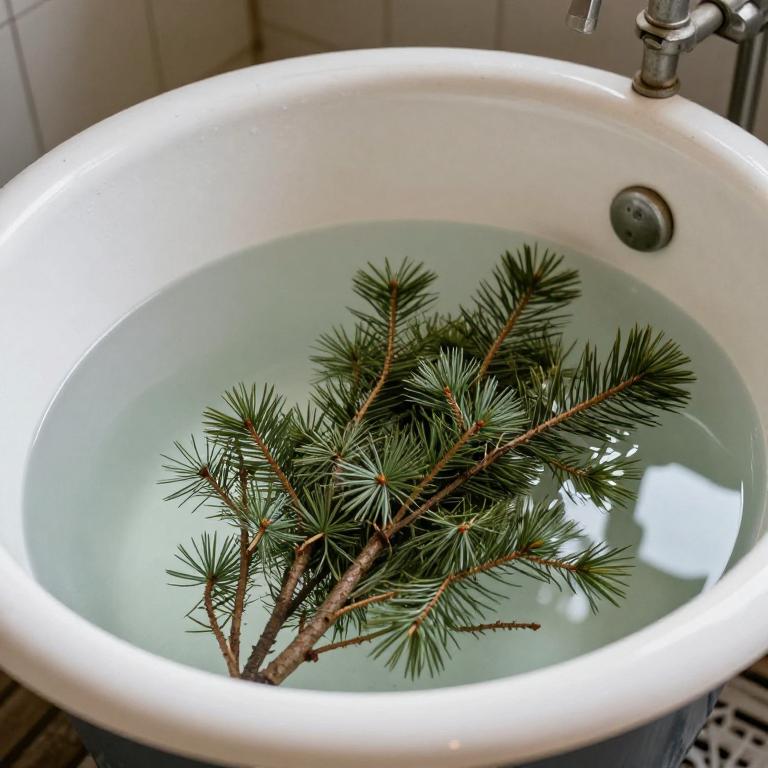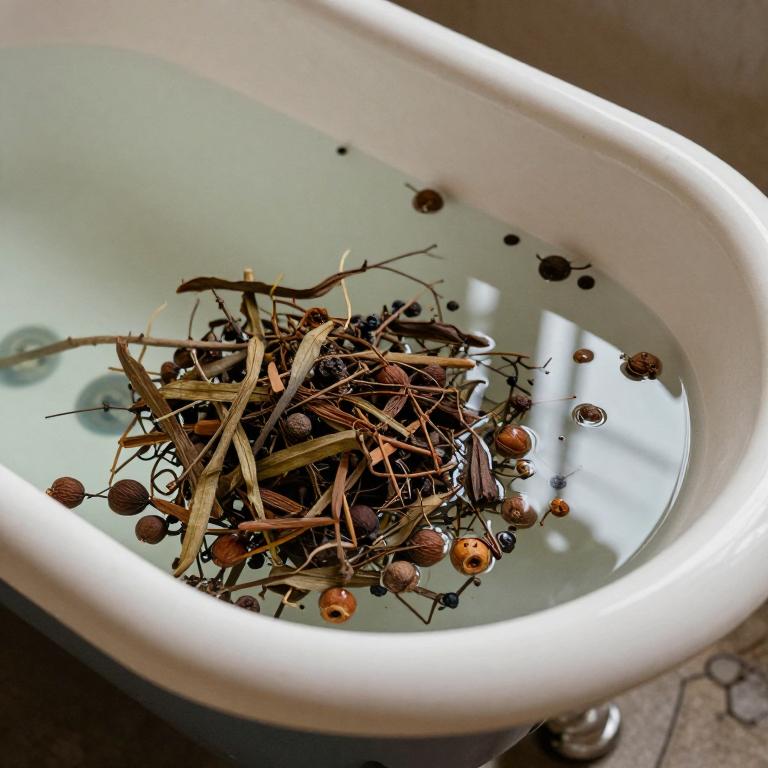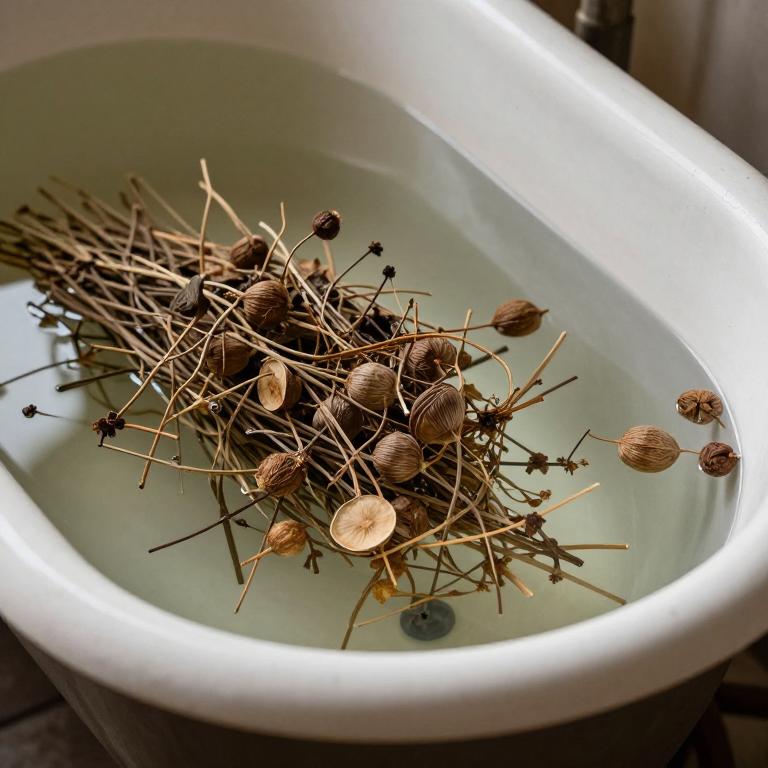10 Best Herbal Baths For Nasal Congestion

Herbal baths can be a soothing and effective remedy for nasal congestion by promoting relaxation and improving overall respiratory function.
Certain herbs, such as eucalyptus, chamomile, and lavender, are known for their decongestant and anti-inflammatory properties, which can help ease breathing when added to bath water. The warm steam from the bath enhances the release of these beneficial compounds, allowing them to be inhaled and penetrate the nasal passages. Taking a herbal bath regularly can also help reduce inflammation in the airways and support the body's natural healing process.
While not a substitute for medical treatment, herbal baths offer a natural and complementary approach to managing nasal congestion.
Table of Contents
- 1. Eucalyptus (Eucalyptus globulus)
- 2. Peppermint (Mentha piperita)
- 3. Salvia (Salvia officinalis)
- 4. Ginger (Zingiber officinale)
- 5. Rosemary (Rosmarinus officinalis)
- 6. Thyme (Thymus vulgaris)
- 7. Scots pine (Pinus sylvestris)
- 8. Black pepper (Piper nigrum)
- 9. Ceylon cinnamon (Cinnamomum verum)
- 10. Stinging nettle (Urtica dioica)
1. Eucalyptus (Eucalyptus globulus)

Eucalyptus globulus, commonly known as eucalyptus oil, is a popular herbal remedy used in steam or bath inhalation to alleviate nasal congestion.
When added to warm water in a bath, the steam helps release the essential oils, allowing the aromatic compounds to be inhaled and penetrate the nasal passages. This can help reduce inflammation and loosen mucus, providing relief from stuffiness and improving breathing. The menthol and cineole content in eucalyptus oil are believed to have decongestant and anti-inflammatory properties.
However, it is important to use eucalyptus oil in a properly diluted form to avoid skin irritation and ensure safe use, especially for children or individuals with asthma.
2. Peppermint (Mentha piperita)

Mentha piperita, commonly known as peppermint, is a versatile herb often used in herbal baths to alleviate nasal congestion.
When added to warm water, peppermint essential oil or fresh leaves can create a soothing bath that helps open up the airways and ease breathing. The aromatic compounds in peppermint, such as menthol, have decongestant properties that may help reduce inflammation in the nasal passages. Taking a peppermint herbal bath can also promote relaxation and reduce the overall feeling of stuffiness.
This natural remedy is particularly beneficial for those seeking a gentle, non-pharmaceutical approach to managing nasal congestion.
3. Salvia (Salvia officinalis)

Salvia officinalis, commonly known as sage, has been traditionally used in herbal baths to alleviate nasal congestion due to its antiseptic and decongestant properties.
When infused into bath water, the steam from the warm bath can help open up the airways and ease breathing by reducing inflammation in the nasal passages. The aromatic compounds in sage, such as thujone and cineole, are believed to have a soothing effect on the respiratory system. Using sage in a bath can also provide a calming and relaxing experience, which may further support respiratory health.
However, it is important to consult with a healthcare professional before using sage baths, especially for individuals with existing respiratory conditions or allergies.
4. Ginger (Zingiber officinale)

Zingiber officinale, commonly known as ginger, has been traditionally used in herbal baths to alleviate symptoms of nasal congestion due to its warming and decongestant properties.
When infused into bath water, ginger helps to improve circulation and promote the release of mucus, making it easier to breathe. The aromatic compounds in ginger can also stimulate the nasal passages, offering a natural relief from stuffiness. These baths are often recommended for individuals suffering from colds, allergies, or sinusitis.
Incorporating ginger into a warm bath not only provides respiratory benefits but also promotes overall relaxation and wellness.
5. Rosemary (Rosmarinus officinalis)

Rosmarinus officinalis, commonly known as rosemary, has been traditionally used in herbal baths to alleviate nasal congestion due to its aromatic and anti-inflammatory properties.
When infused into bath water, rosemary essential oil can help open up airways and promote respiratory relief by stimulating circulation and reducing mucus buildup. The warm steam from the bath enhances the inhalation of rosemary's fragrant compounds, which may help soothe irritated nasal passages and ease breathing. This natural remedy is particularly beneficial for individuals experiencing sinus pressure or cold-related congestion.
Incorporating rosemary into a warm bath not only offers respiratory benefits but also promotes relaxation and overall well-being.
6. Thyme (Thymus vulgaris)

Thymus vulgaris, commonly known as thyme, has been traditionally used in herbal baths to alleviate symptoms of nasal congestion due to its antimicrobial and anti-inflammatory properties.
When infused into bath water, thyme essential oils can help open up the nasal passages and ease breathing by stimulating the release of mucus and reducing inflammation in the respiratory tract. The warm water of the bath enhances the absorption of thyme's active compounds, such as thymol, which have natural decongestant effects. This practice is often recommended as a complementary therapy for individuals suffering from colds, allergies, or sinus infections.
However, it is important to dilute thyme essential oil properly to avoid skin irritation and consult with a healthcare professional before use, especially for those with sensitive skin or respiratory conditions.
7. Scots pine (Pinus sylvestris)

Pinus sylvestris, commonly known as Scots pine, has been traditionally used in herbal baths to alleviate symptoms of nasal congestion.
The essential oils extracted from its needles contain compounds like alpha-pinene and beta-pinene, which possess anti-inflammatory and decongestant properties. When infused into bathwater, these oils can be inhaled through steam, helping to open up nasal passages and reduce mucus buildup. This natural remedy is often recommended for those experiencing sinusitis or the common cold.
Incorporating Scots pine into a warm herbal bath not only provides respiratory relief but also promotes relaxation and overall well-being.
8. Black pepper (Piper nigrum)

Piper nigrum, commonly known as black pepper, has been traditionally used in herbal remedies for its warming and decongestant properties.
When incorporated into a herbal bath, the aromatic compounds of black pepper can help open up the nasal passages and alleviate symptoms of nasal congestion. The steam from the bath enhances the absorption of these beneficial compounds, promoting respiratory ease and comfort. This natural remedy is often combined with other herbs like eucalyptus or ginger to amplify its effectiveness.
While it can provide relief, it is advisable to consult a healthcare professional before using herbal baths, especially for individuals with chronic respiratory conditions.
9. Ceylon cinnamon (Cinnamomum verum)

Cinnamomum verum, commonly known as true cinnamon, has been traditionally used in herbal baths to alleviate nasal congestion due to its warming and decongestant properties.
When infused into bath water, the aromatic compounds of cinnamon can help open up the nasal passages and ease breathing by stimulating blood circulation and reducing inflammation. The steam from the warm bath enhances the inhalation of cinnamon’s essential oils, which may help soothe irritated nasal tissues and reduce mucus buildup. This natural remedy is particularly beneficial for individuals suffering from colds, sinusitis, or allergies, offering a gentle and holistic approach to respiratory relief.
However, it is advisable to use caution with prolonged exposure to cinnamon steam, as it may irritate the skin or respiratory system in sensitive individuals.
10. Stinging nettle (Urtica dioica)

Urtica dioica, commonly known as stinging nettle, has been traditionally used in herbal baths to alleviate symptoms of nasal congestion.
The plant contains compounds such as histamine and formic acid, which can cause a tingling sensation when applied to the skin, potentially stimulating circulation and reducing inflammation. When used in a bath, the steam from the water can help open up the nasal passages and ease breathing. Some proponents suggest that the anti-inflammatory properties of stinging nettle may help reduce mucus production and soothe irritated nasal tissues.
However, it is important to consult with a healthcare provider before using stinging nettle baths, especially for individuals with sensitive skin or underlying health conditions.